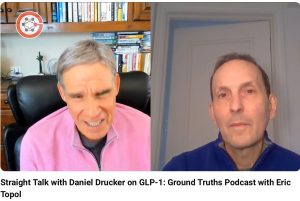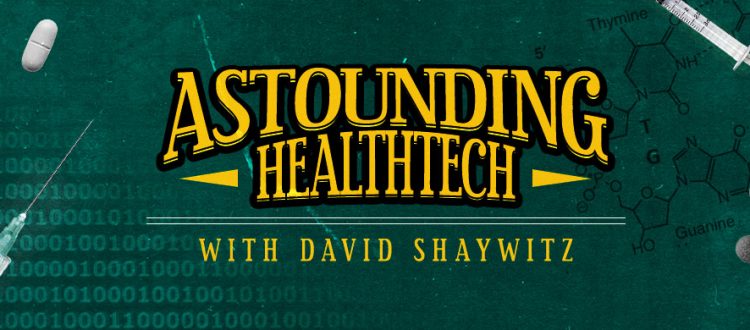Here’s The Skinny on Four New GLP-1 Podcasts

David Shaywitz
GLP-1 medicines are obviously having a real moment – medically and culturally.
These once-weekly injectables, which reduce appetite and result in significant, long-lasting (so long as you’re taking them…) weight loss, have been demonstrated to have a number of important health benefits beyond simply shedding pounds.
In March, Novo Nordisk’s semaglutide (Wegovy) was approved by the FDA for its ability to reduce the risk of heart attack, stroke, and death from cardiovascular disease in patients who are obese or overweight.
This new wave of effective weight loss drugs has elevated the pharma companies that make them, Novo Nordisk and Eli Lilly. Novo Nordisk reported $1.3 billion in Wegovy sales in the first quarter of 2024 – about double the amount from the same period a year earlier. Eli Lilly’s rival GLP-1 and GIP receptor agonist, tirzepatide (Zepbound), recorded an extraordinary $517 million in US sales in the first quarter of 2024, in the first full quarter after being approved by the FDA in November.
The progress and momentum has also generated significant interest from other pharmas suddenly seeking to enter a therapeutic area that they have long been avoiding.
The availability of an apparently safe category of medicines that address a key societal preoccupation – obesity – has reverberations that have been felt everywhere from the Oscars to the diet industry – and, potentially, many other sectors of the economy.
Many companies focused on weight management, for example, have decided that instead of competing directly with GLP-1 medicines, it makes more sense to incorporate these medicines into their offerings (eg Weight Watchers) or to position themselves as an off-ramp (Virta).
On a personal level, I appreciate their motivation. After significant success on Virta (discussed here, here), I’ve found it increasingly difficult to sustain (a common experience, it seems). As my weight, sadly, starts to creep back up despite regular exercise, I find myself actively contemplating a switch to GLP-1s, especially as I encounter more and more physician colleagues experiencing success with these powerful medicines.
Keeping up with the GLP-1 story can be difficult; fortunately, several recently-released podcasts, each with a slightly different focus, can help get you up to speed quickly – ideally while you’re exercising.
Ground Truths: Eric Topol interviews Daniel Drucker
Let’s start with the science. Here, the one person you’d most want to speak with is endocrinologist and physician-scientist Daniel Drucker, who has spent his career focused on incretins – molecules such as GIP-1 (glucose-dependent insulinotropic polypeptide) and GLP-1 (glucagon-like peptide-1) that potentiate the secretion of insulin after meals.

Eric Topol (left) and Daniel Drucker (right) on the Ground Truths podcast.
His website, glucagon.com, has for years served as a central repository of information in this field, including the many foundational studies and integrative reviews authored by Drucker and his colleagues.
In the latest episode of famed cardiologist Eric Topol’s invariably interesting podcast Ground Truths, he asks Drucker key questions about the underlying science. What I found particularly striking was how much is still unknown. (This seems like another example of a phenomenon I’ve frequently encountered, where real experts are comfortable enough to recognize and acknowledge the vast extent of our collective ignorance; in contrast, many with a more tenuous grasp of the material tend to present it with more certitude and bluster.)
The entire, relatively short (36-minute) podcast is an obvious must for anyone interested in a data-driven, grounded, sophisticated perspective on GLP-1s, but several points of particular relevance for readers of TR and this column include:
- Subtle biology of GLP-1: Drucker say, “if we take GLP-1 away or we take the receptor away, you don’t really develop diabetes without GLP-1. You don’t really gain a lot of weight without GLP-1. So physiologically it’s not that important.” In other words, for all our interest in leveraging genetics to find new drugs, GLP-1 is an example of how this approach can be limiting – the pharmacological effects of GLP-1 might not have been predicted by extrapolating from observed physiology and pathophysiology. Moreover, Drucker notes, molecules that were associated with more informative genetics, like leptin, have not translated thus far into broadly effective medicines for the treatment of obesity.
- GLP-1 seems to “talk to the brain,” but indirectly; the mechanism seems unclear: Drucker explains that GLP-1 “doesn’t directly get into the brain to a meaningful extent,” and how it communicates with the brain is “is not well understood … in the magic that we see.” Given the impact of GLP-1 on appetite control, this seems like a glaring gap in understanding – or rather, an important opportunity for future study.
- Role of serendipity: GLP-1 medicines emerged from decades of meticulous research (including foundational and continuing work by Drucker). In other words, the discovery of GLP-1 and the elucidation of their biological and pharmacological effects weren’t simply a happy accident. But what was unbelievably lucky, it seems, is that the medicines work as well as they do with an apparent paucity of serious side effects. Drucker notes that while there are some side effects when patients start taking GLP-1 medicines, these tend to dissipate, while the positive effects on appetite suppression persist. (The most common side effects are nausea, vomiting, and diarrhea).
Acquired: Novo Nordisk
The Acquired podcast – recently described by the Wall Street Journal as what “the smartest people in the room are all listening to” – is a monthly, in-depth discussion of a leading company, hosted by former-VCs Ben Gilbert and David Rosenthal.
In January, Gilbert and Rosenthal took on their first life science company, Novo Nordisk, reviewing its fascinating history, and contextualizing its strategy in the context of other businesses. Listening to two smart, enthusiastic business analysts, who aren’t pharma insiders, wrap their heads around the complexities of healthcare and drug development was engaging and illuminating. The episode, as usual for Acquired, is long (this one runs over three and half hours!) but captivating and worth your time.
Key points for TR readers:
- Importance of a champion: Drug development requires champions (see here, here, here). In this case, the champion is Novo Nordisk’s Lotte Bjerre Knudsen, who led the effort to develop a long-acting GLP-1, and then to guide it towards obesity. The magnitude of this achievement is especially remarkable since the CEO at the time, Lars Rebien Sorensen, was initially skeptical about developing GLP-1 for obesity. “Obesity is primarily a social and cultural problem,” he once said. “It should be solved by means of a radical restructuring of society. There is no business for Novo Nordisk in that area.”

Lotte Bjerre Knudsen
- Focus on obesity from the beginning (this is actually from ACQ2, a second podcast hosted by Gilbert and Rosenthal, in an episode focused on Knudsen): “The target market was also obesity from the beginning,” Knudsen says about GLP-1 molecules, pushing back on idea that they somehow stumbled into obesity. “We did have a strategic intent to go after obesity early on.
- Recognition of the risk of drug development: Perhaps my favorite part of the episode was when Gilbert and Rosenthal discuss the remarkable challenges and exceptional risks of drug development, in the context of other businesses. Their recognition and articulation of the difficulty and urgency of coming up with new medicines represents a level of insight that seems to have eluded many others.
As strong as this episode is, the hosts may overstate their case when they suggest Novo’s exceptional business performance may be attributable to their concentration in, and singular focus on diabetes and metabolism. While Novo’s deep experience in diabetes and metabolism unquestionably facilitated their development of GLP-1 medicines, they are also incredibly lucky that these medicines turned out to be such a breakout hit, and not (as discussed above) saddled with all sorts of side-effects or other challenges.
Concentrating efforts in any one area is like putting all your chips on a particular Roulette number – if you’re lucky, you can win big, but if not (for example, if you went all-in on Alzheimer’s Disease, an incredibly urgent medical need that hasn’t yet seen great therapeutic success), you might fare poorly.
If you are going to bet big, however, it makes sense to do it in an area where you are expert, and can both choose as wisely as possible, and also be prepared to take advantage of a win if you get one. Gilead’s acquisition of Pharmasset for $11.4B in 2011 – derided by many analysts at the time, just before they started applauding Gilead’s subsequent success in curing hepatitis C – seems like a similar example.
Honestly: Bari Weiss interviews Johann Hari
Bari Weiss and the Honestly podcast offer independent-minded takes on a range of issues, including topics related to health. Here, she interviews author Johann Hari about his latest book, Magic Pill (I discussed his previous effort, Stolen Focus, for TR readers here).
Hari’s new work features reporting on GLP-1 medicines including in particular their social context, a perspective he succinctly summarizes in a recent New York Times op-ed.
It was especially interesting to listen to Hari’s distillation after hearing Drucker’s, because Drucker’s presentation emphasized the limitations of science and the many areas of ambiguity and uncertainty, while Hari offered a tidy narrative that at times felt scientifically dubious.
Key highlights for TR readers:
- View that the American diet is responsible for altered satiety setpoint: Hari tells us about a neuroscientist, Paul Kenny, who early in his career was struck by the differences between the United States and his native Ireland, and his sense that American food was affecting his mind as well as his body. Kenney later discovered that rats who were raised on a normal diet and then offered American food “went crazy for the American diet…within a couple of days, they were different animals. And they very rapidly all became obese.”
- Examples of healthier food in other countries like Japan, where the obesity rate is 4%, compared to a rate of 42% in the United States: Hari describes visiting a “typical” school in Japan, and discovering processed food is banned, kids are served “unbelievably healthy” freshly-prepared meals, and children express preferences for healthy vegetables like broccoli. (Like Hari, I found this unimaginable, and wasn’t surprised to hear his first thought was that he was being trolled by the kids; he wasn’t.)
- Examples of approaches to obesity management in the work setting that seem unimaginably over the top. Hari tells us about a law in Japan mandating that “every company in Japan has to weigh its entire staff on a particular day. And if your weight has gone up, you have to make a plan with your employer to bring it down. And if as a company overall your staff’s weight has gone up, you are fined by the government.”
The Journal: Trillion Dollar Shot
One of my favorite podcasts is The Journal, co-produced by Gimlet and the Wall Street Journal. Most days, they look in depth at a topic in the news, but occasionally they put together a series taking an even deeper look at an important topic, seeking and sharing multiple perspectives across several episodes. I recent highlighted another Journal series (With Great Power) that focused on the birth of Marvel studios.
The current series (as of this writing only the first episode has dropped) promises an examination of GLP-1 medicines – how they were developed, and the effects they are having on “bodies, fortunes, and industries.”
Key highlights for TR readers:
- A recurrent theme of innovation has been the need for persistence and conviction, along with the uncomfortable fact that, as Judah Folkman said, “If your idea succeeds, everybody says you’re persistent. If it doesn’t, you’re obstinate.” The problem is you can’t figure out until later the category in which you belong. It’s clear from this podcast that Lotte Bjerre Knudsen, the champion we met earlier, was persistent. The former CEO of Novo, Lars Rebien Sorensen, describes Knudsen as “a person that’s very, very difficult to say ‘No’ to,” someone whose team succeeded “because of their stubbornness and their skills and their professionalism.”
- Industry view of obesity drugs: Sorensen also highlights the initial concerns of pursuing GLP-1 medicines for obesity, noting that “at the time, almost all without exception, weight-lowering drugs had failed, some even so badly that companies were sued. So I knew that if we started talking too much about the obesity effect of GLP-1, we might taint a very good diabetes drug.” (As noted earlier, Sorensen also viewed obesity as a social rather than a medical challenge.)

Dr. Fatima Cody Stanford, obesity medicine expert, MGH
- Unexpected high discontinuation rate: Perhaps the most striking fact I learned from all of these podcasts was the exceptionally high discontinuation rate from GLP-1 medicines. The Acquired podcast that noted “one out of six patients have side effects that are so severe that they discontinue the drug,” and “as many as 68% of people roll off it after a year.” This is especially surprising since most of the weight lost due to GLP-1 medicines returns if the drug is discontinued. The Journal podcast offered the most compelling insight into the potential reasons for the high rate of discontinuations; one of the journalists reporting the story actually stopped taking the medicine himself although it seemed to be working well for him. The key reasons for discontinuation seem to be (a) cost (a huge factor and the reason the reporter stopped); (b) side effects; (c) the inconvenience of needing to hunt for supplies of a medicine where manufacturing can’t keep with the demand. Dr. Fatima Cody Stanford, of the MGH Weight Center, tells me that the most significant issue in her experience has been serious ongoing challenges with the supply.
Collectively, these podcasts offer different but overlapping perspectives on GLP-1 medicines, and provide insight into the history, science, and strategy around these medicines. They also remind us of the complex interplay between transformative medicines and broader society, and the need for life science companies to engage with it – ideally with authentic curiosity, humility, and empathy.





